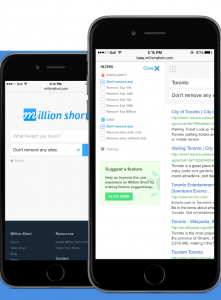A Toronto-based company is offering a new way to search for stuff online.
A good way to find more information on the Web, say the folks at Million Short, is to get less. Its seemingly counter-intuitive idea is that you will get better search results from fewer search results.
Million Short entered the search space by offering a new search engine that gives users filters and functions not available from the large, dominant search providers.

Less is more. Small is beautiful.
Not unfamiliar concepts to spiritual seekers or modern economists. But perhaps new to folks who want to discover data on the Internet.
The most basic of those tools lets web searchers remove a big slice of search results. Up to a million sites can be removed by applying a filter, thus revealing other sites or search results that, for various reasons, do not rank high enough to make it to the first page of results.
(Yes, you could toggle through the many pages of search results and skip through them yourself, but Million Short has other tools in its kit.)
Company founder and CEO Sanjay Arora has described his vision for the company as overturning the current search environment (dominated by just a few major search engines) and making more available websites that may not rank highly enough in the eyes of biggest search platforms. It’s a way to level the playing field, he says, and to provide visibility to sites that may suffer from poor search engine optimization (SEO) and indexing protocols, or those that do not have sponsored suggestions to inflate traffic and visibility, or those that just don’t have the same degree of marketing or site management resources to attract online attention.
Of course, no search tool compares with the power, reach and ubiquity of Google: it’s service is widely used and rightly so.

Million Short offers different filters so users can drill down into search results and remove the ones most highly ranked by popularity, the ones with sponsored content and advertising, or the ones that are e-commerce sites, for example.
“A lack of (good) SEO practices means you may not show up on the first few pages of the Google search results,” he explained during an Innovation Navigation interview. There’s a search engine pyramid and at the top are the big sites (Facebook, Linked In, Amazon, etc.). To get past those search results quickly, Million Short offers different filters so users can drill down into those inflated results, and remove the ones ranked by popularity, the ones with sponsored content and advertising, or the ones that are e-commerce sites, for example.
In that sense, Million Short can be seen as a complimentary search tool, not a replacement. Think about searching for a particular product, for example: you want to get good, balanced, unbiased information about the product to make the best purchase decision.
First, you could skip the sites that benefit directly from selling the product and may or may not be providing the best information for that reason (by using the e-commerce filter, for example). Once you have done that deeper research into what’s good or bad about the product, you can always go back to the competitive e-commerce sites (or real-world physical stores) in order to make the actual purchase at the best price.
Another reason you might want to find different search results is to avoid what’s called search engine bias or the “filter bubble”.
That bubble is created by the proprietary search and indexing tools used by the major private search companies: we do not know exactly how Google ranks all the hundreds of millions of web pages out there. But algorithms used by the major search platforms and providers determine what search results we get, what data we can find, what information is readily available to us. So not understanding that filter set makes people nervous (or it should).
Limitations on what we can shop for is one thing; limitations on the knowledge we can find is another: it may in fact be a very corrosive factor influence on our culture, our society, our politics.
Getting past those kind of restrictions make a concept like Million Short attractive to not only casual Web users, but also to academics, researchers, recruiters and, well, even national security and intelligence agencies, Arora described.
Million Short is licensing its API to various customers in the retail and B2B space, he’s looking at whether a subscription- or a micropayment-based business model would be attractive to the general audience.
Right now, most of the Million Short search filters are freely available and the different search results immediately noticeable. (Although I encountered a couple of glitches in the process, I could see that by removing the top 100 or 10,000 results, I could more easily find otherwise obscured content.)
It’s surely hard to imagine what the Internet would look like without Google, and that is not necessarily what Million Short is after. Sanjay Arora sees his offering as a companion service, one that offers us a second look at what we’re searching for.
-30-



